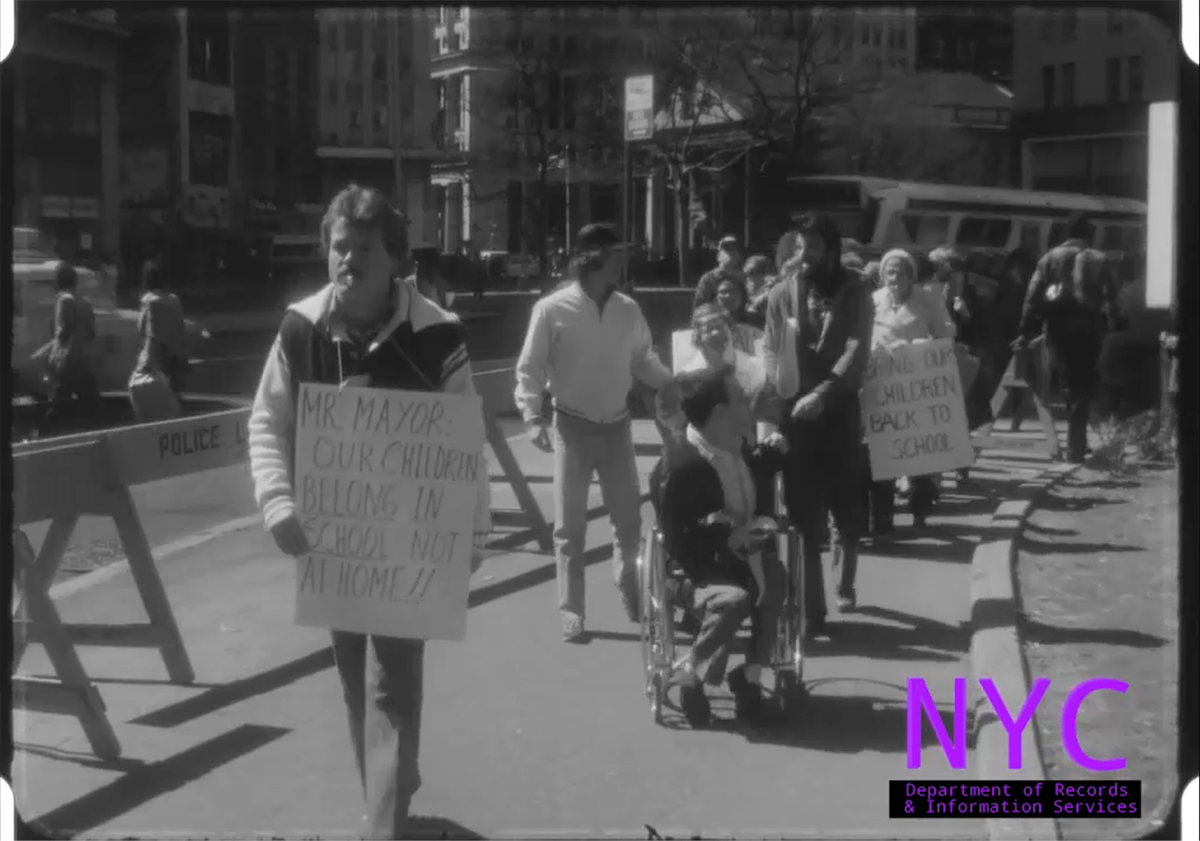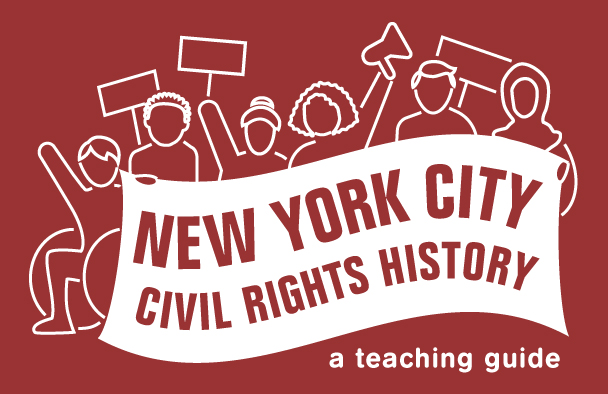You are here:
Parents Protest for School Transportation

Date: March 1979
Caption: A bus driver strike meant that Disabled children who relied on buses to get to school lost their transportation, keeping many from being able to attend school. Police surveillance cameras recorded parents and children protesting at City Hall to end the strike so they could get back to school.
In early 1979, the Board of Education decided to change the rules for private bus operators in a way that would have lowered wages for many drivers. More than 2,000 bus drivers went on strike for over 13 weeks.
At the time, there were 132,000 schoolchildren who rode buses to school, including 32,000 Disabled children, who often traveled far distances for special education programs. They could not get to school without busing.
During the bus drivers’ strike, some parents with cars drove their children, but many parents were forced to stay home from work to take care of their children. Some lost their jobs as a result. The Board of Education scrambled to find alternative transportation, giving free subway passes for children who could take public transportation, and started “Operation Kiddie Lift” where school employees volunteered to drive about 700 children with physical disabilities to school in rented vehicles.1 Early in the strike, the city even resorted to transporting children in buses from the Corrections Department.2
Nearly half of children with disabilities were unable to get to school during the strike. Those who were left out of programs like “Operation Kiddie Lift” felt this was discrimination against children with epilepsy and other types of disabilities.3 Parents of Deaf children attending the Lexington School for the Deaf held a separate protest for reimbursement for private transportation. One official commented, “deaf children are not looked upon as handicapped because they physically look like everybody else.”4
This film, from about five weeks into the strike, shows a “whistle protest” of about 700 parents and children near City Hall. Protesters were angry about the prolonged strike and the mayor’s refusal to negotiate with the bus drivers.5 The mayor and bus drivers union accused each other of using Disabled children as pawns in the negotiations.
Protesters carried signs that read:
- Mr Mayor, Our Children Belong Back In School
- We didn’t do it. Why keep us waiting?
- We want our buses
- Mr Mayor Stop Using Our Children as Political Pawns
- Our Children Belong in School, Not at Home
- We Demand Education for Our Children
- I have nothing to do at home
- The Year of the Child
In response to the protest, the city announced that they would provide funding for private taxis and send parents instructions for how to request money for taxis if alternative transportation was not available.5 In the end, the bus drivers and the school chancellor agreed to give job security to current drivers but allowed for more bus companies to compete for future contracts.6 Bus drivers went on strike again in 2013 for similar reasons.7 In 2023, parents of Disabled children filed a federal complaint over bus driver shortages that kept their children out of school.8
-
Alison Mitchell, “Both Sides Feel Burden of Strike,” Newsday, March 2, 1979. ↩︎
-
Alison Mitchell, “Drivers Vote To Continue Bus Strike," Newsday, February 27, 1979. ↩︎
-
Mitchell, Newsday, March 2, 1979. ↩︎
-
David Medina, “City to pay deaf pupils’ school fare,” New York Daily News, March 16, 1979. ↩︎
-
“Protest city’s effort," New York Daily News, March 21, 1979. ↩︎ ↩︎
-
David Bird, “Instructions Are Given On Alternative Means To Transport Students,” The New York Times, March 22, 1979, https://www.nytimes.com/1979/03/22/archives/instructions-are-given-on-alternative-means-to-transport-students.html. ↩︎
-
“School Bus Drivers Strike in NYC,” CNN, January 16, 2013, https://www.cnn.com/2013/01/16/us/new-york-school-bus-strike/index.html. ↩︎
-
“NYC Students with Disabilities File Federal Civil Rights Complaint against Public School System over Transportation Woes,” New York Daily News, October 25, 2023, https://www.nydailynews.com/2023/10/25/nyc-students-with-disabilities-file-federal-civil-rights-complaint-over-transportation-woes/. ↩︎
Categories: Manhattan, K-12 organizing, adult education, parent activism, student activism
Tags: racist segregation, physical disabilities, architectural barriers, transportation, Disabled people, protest, school facilities, labor unions
This item is part of "The Parents’ Movement for Deinstitutionalization and School Access" in "Seeking Equity for Disabled Students"
Item Details
Date: March 1979
Creator: New York Police Department Surveillance Unit
Source: Municipal Archives of the City of New York Digital Collection
Copyright: Under copyright. Used with permission. Courtesy of the Municipal Archives of the City of New York.
How to cite: “Parents Protest for School Transportation,” New York Police Department Surveillance Unit, in New York City Civil Rights History Project, Accessed: [Month Day, Year], https://nyccivilrightshistory.org/gallery/parents-protest-for-school-transportation.
Questions to Consider
- This bus strike prevented many Disabled students from attending school, denying them their right to an education. Do you think access to transportation affects schools and students today? How so?
- News coverage emphasized white mothers who were at home all day with their children. What made this economically feasible? For whom was this not an option?
- Why do you think Mayor Koch focused his emergency transportation program, “Operation Kiddie Lift,” on children with physical disabilities, rather than on all Disabled children?
References
How to Print this Page
- Press Ctrl + P or Cmd + P to open the print dialogue window.
- Under settings, choose "display headers and footers" if you want to print page numbers and the web address.
- Embedded PDF files will not print as part of the page. For best printing results, download the PDF and print from Adobe Reader or Preview.
